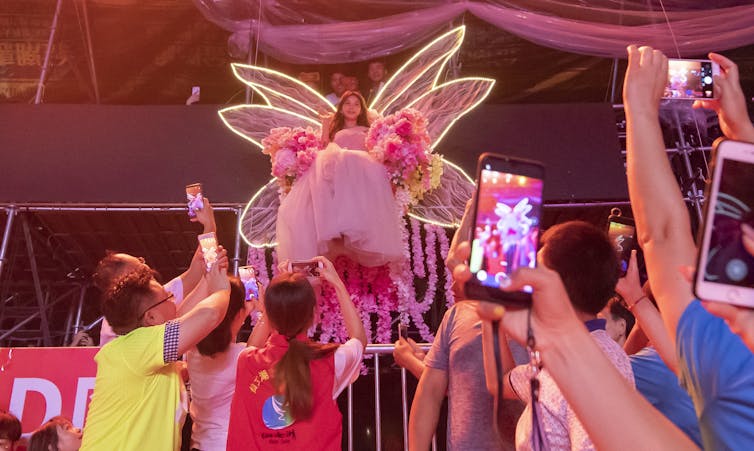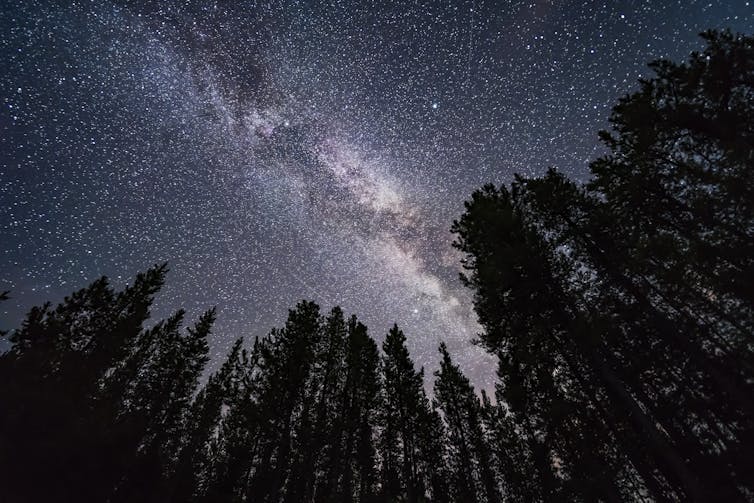How China does Valentine's Day
- Written by Wei Li, Associate Professor of Sociology, Frostburg State University
Americans celebrate love on Feb. 14, Valentine’s Day[1] — a holiday named for Saint Valentine, a third-century Roman clergyman who secretly performed weddings for soldiers forbidden to marry under Emperor Claudius II.
But other countries honor romance on different days with their own legends.
China’s Qixi, which occurs on the seventh day of the seventh month on the Chinese calendar – early August on the Western calendar – is a couples’ holiday based on the Chinese folktale[2] about two star-crossed lovers: “Niulang,” or Cattleman, and “Zhinü,” the Weaver Lady.
Bridge to love
In Chinese myth, Cattleman was a handsome young mortal who once healed a dying ox. In return for saving his life, the ox helped Cattleman find a wife.
“At dusk seven goddesses will come down from heaven to bathe in the nearby lake,” he told Cattleman, according to legend[3], adding that the youngest, Zhinü, was the prettiest. The two met, fell in love and decided to get married.
The goddess was a weaver fairy and the youngest daughter of the almighty goddess of heaven. Her mother, furious that her daughter had married a mere man, sent her celestial soldiers to return Weaver Lady to heaven.
 Model and actress Lin Chi-ling as the Weaver Lady at a 2019 Qixi Festival gala broadcast on national TV.
Visual China Group via Getty Images[4]
Model and actress Lin Chi-ling as the Weaver Lady at a 2019 Qixi Festival gala broadcast on national TV.
Visual China Group via Getty Images[4]
The grateful old ox, now on death’s door, told Cattleman to put on his skin after he died. Upon doing so, Cattleman discovered he could fly to heaven to retrieve his wife.
However, just before he reached Weaver Lady, the goddess of heaven threw her silver hairpin toward Cattleman, creating a swirling river that separated the young couple. This river became the Milky Way, or yinhe – the “Silver River” – in Chinese.
Cattleman and Weaver Lady’s story moved all the magpies on Earth, according to the Qixi legend. They flew up to heaven to bridge the Silver River. Relenting, the goddess of heaven allowed the young lovers to meet on the Magpie Bridge – but only once a year, on the seventh day of the seventh month. Qixi means “seventh day.”
Eventually, Cattleman and the Weaver Lady turned into stars, which in English are called Altair and Vega. They twinkle in the night sky as eternal symbols of romantic love.
 The Milky Way, or ‘Silver River’ in Chinese, divides Vega, on the right, from Altair, on the lower left.
Universal Images Group via Getty Images[5]
The Milky Way, or ‘Silver River’ in Chinese, divides Vega, on the right, from Altair, on the lower left.
Universal Images Group via Getty Images[5]
Qixi traditions
In olden times Chinese women celebrated Qixi with weaving, embroidering and paper-cutting. In one popular dexterity contest, ladies competed to thread a bronze needle with seven holes on it under moonlight[6]. Young women would also pray to Vega for a good husband[7].
Today China’s Qixi festival is more of a commercial affair, like American Valentine’s Day. Couples go on dates, declare their love and exchange gifts like flowers, perfume or jewelry.
While researching international marriages in China[8], I’ve learned the legend of Qixi also lives on in curious ways.
China, with its surplus of young bachelors, has a major industry of online marriage brokers[9]. Some of these businesses are called “magpie bridges,” because they bring lovers together – alas, not gods, but mere mortals.
[Like what you’ve read? Want more? Sign up for The Conversation’s daily newsletter[10].]
References
- ^ celebrate love on Feb. 14, Valentine’s Day (www.npr.org)
- ^ Chinese folktale (theculturetrip.com)
- ^ legend (ja.wikipedia.org)
- ^ Visual China Group via Getty Images (www.gettyimages.com)
- ^ Universal Images Group via Getty Images (www.gettyimages.com)
- ^ under moonlight (zh.wikipedia.org)
- ^ good husband (en.wikipedia.org)
- ^ international marriages in China (theconversation.com)
- ^ industry of online marriage brokers (theconversation.com)
- ^ Sign up for The Conversation’s daily newsletter (theconversation.com)
Authors: Wei Li, Associate Professor of Sociology, Frostburg State University
Read more https://theconversation.com/how-china-does-valentines-day-129420

